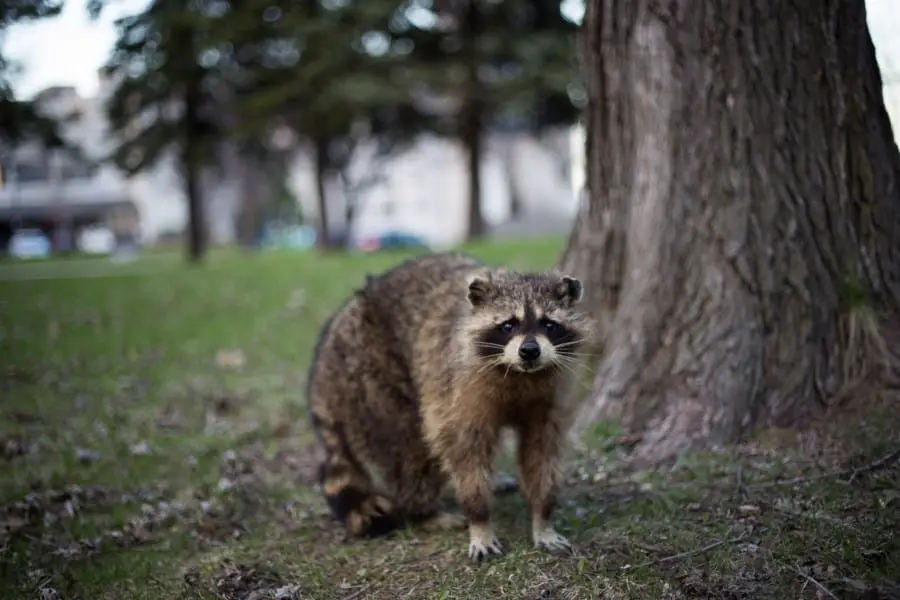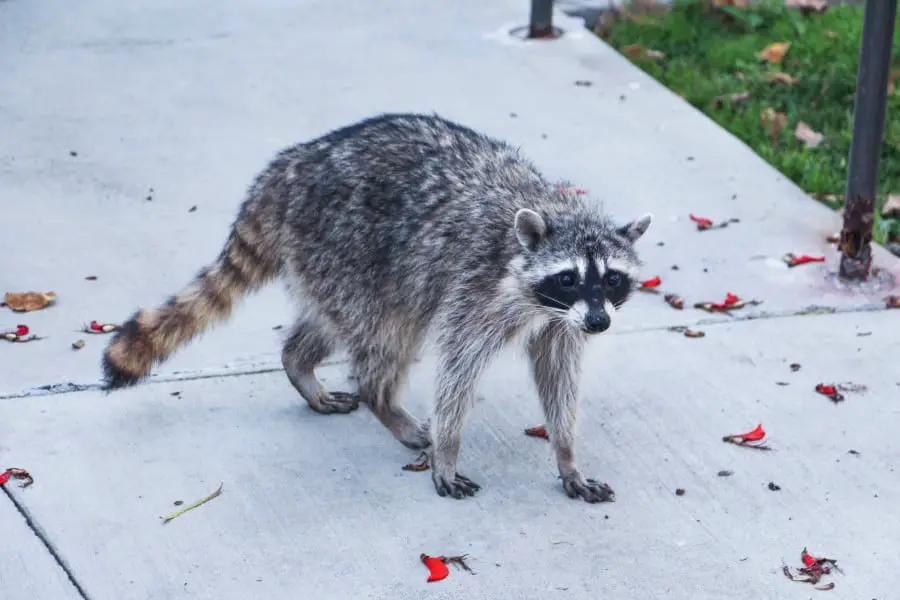They may look quite cuddly, but are Raccoons dangerous? This article will provide a clear understanding of whether raccoons attack humans, are they harmful, or dangerous and more.
Here’s the quick takeaway answer, then we’ll dive into more detail…
Do raccoons attack humans? Raccoons do attack humans mostly during the night, but rarely. Although raccoons get aggressive when provoked they do not tend to attack humans unless they or they’re young are threatened, or they feel cornered. Apart from this raccoons attack humans when they are sick, even without any provoking.
Raccoons are animals found in the forest, woods, and mixed rainforest, but with the invasion of humans into their living lands, their interactions with humans have naturally increased.
So nowadays it’s not uncommon to see a raccoon living in or around your property, walking along the streets of urban and suburban spaces and occasionally even knocked over by cars.
However, when humans encounter raccoons, they have a mixed behavior between aggressive and non-aggressive. This makes raccoons harmful or prone to attacks but it’s rare.

Are raccoons aggressive?
For any animal to be prone to attack, it needs to be a naturally aggressive species. Although it may be hard to believe it’s uncommon for raccoons to be aggressive towards humans.
Raccoons mainly become aggressive only when provoked. There are however a number of things and situations that can provoke aggression in raccoons – which may cause them to attack humans.
Threatened or provoked aggression
One common – or main event that provokes aggression in raccoons is when they find humans (or any other creature) threatening their young ones. Naturally, this aggression is provoked mainly among female raccoons.
When a female raccoon becomes aggressive due to this reason, it will always try to defend her young through defensive postures and sounds. Usually, Raccoons will arch their back and growl as a sign of defense.
Female raccoons may also give a loud “whoof” sound, as a warning sign to stay back. As a sign of aggression raccoons may also lunge at a person. Raccoons tend to behave aggressively it’s better to back off to a good distance.
Raccoons may also become aggressive if they’re in extreme “scavenging mode”, or when they feel you are a threat to them. Usually, in these situations, they will only show defensive postures and are unlikely to attack you or even chase you unless the situation intensifies.
While these are aggressions provoked by some sort, some raccoons might engage in unprovoked aggression.
Unprovoked aggression
This kind of unprovoked aggression mainly occurs from raccoons who are ill or disoriented. This includes raccoons who are rabid or infected with canine distemper or feline parvovirus. You can often identify an infected raccoon by their behavior and appearance during the day.
So now that brings us to the question, do raccoons attack humans, or can they? How and when!
Can raccoons attack humans?
Raccoons can attack humans. They have the bravery to and all the physical abilities to do so. Although they do not always attack they can be provoked into aggression.
Firstly when aggressive, raccoons only demonstrate noises and postures designed to ward off or scare humans away, which they think may be threatening them. It’s only at the extreme end of aggression that raccoons actually start to attack.
But not all actions of a raccoon should be mistaken for an attack. This is because sometimes raccoons may come closer to you just for curiosity’s sake. Especially if you’re carrying a bag, they may come closer to see if they can find food in your bags.
And in such situations, it’s important for you not to mistake their intentions and start attacking or defending against them.
This is because when raccoons are attacked and cornered in a tight spot with no escape route, they will be determined to fight back with everything they have – effectively they will think they are fighting for their lives. And the results of such attacks can be devastating!
Now that can raise the question of how raccoons attack humans and when?
When and how do raccoons attack humans?
Raccoons are nocturnal animals. They’re usually shy and tend to retreat when they see or sense humans nearby.
So it’s very unusual for raccoons to come out during the day. As such raccoons come out during the night for foraging. So it’s mostly during the night that humans might encounter a raccoon, and therefore even rarer to find one that is likely to attack them, as they’re more active during the night.
But if you see a raccoon during the day, it may be a huge red flag. This is because they come out when the food is scarce and to keep their young ones full and comfortable.
Although they may not attack you, it’s advisable for humans to not tempt them with food and similar curiosities. They may get too curious and chase you to get the food.
If in this situation you then might try to get rid of them, doing this could provoke more extreme aggression from the raccoon which might end up in an attack. This is because one of the reasons why raccoons attack humans is when they feel threatened.
Aside from this, a raccoon may attack during the day…

On rare occasions, you might see a raccoon that may look ill – possibly with discharges from their mouth or eyes, and perhaps with difficulties in walking or even making strange sounds that make them sound weak or disorientated.
It’s these kinds of raccoons that are more dangerous and are likely to attack during the day. This is because when a raccoon is sick, they’re usually at their peak of aggression and they attack – potentially even without any provoking.
Other than these, raccoons most likely attack only during the night. They attack using their sharp thick claws and teeth. They’re also quite physically strong for their size – enough to defend themselves using their bodies.
Now, this takes us to the next question, what happens if they attack?
What happens when a raccoon attacks?
Raccoon attacks are dangerous and can even result in death. If attacked, humans need to seek immediate medical help after an aggressive encounter with a raccoon.
However even if you have not encountered an attack, you need to seek medical attention if you come into contact with raccoon feces, body fluids or urine. This is because raccoons are common rabies carriers. Next to bats raccoons are frequently linked to rabies cases in the United States. These diseases can easily be contracted even by inhaling the air alone without direct contact needed.
Raccoon feces are carriers of Leptospirosis, Salmonella, and the raccoon roundworm, which all can cause life-threatening diseases. Raccoons also carry bacteria in their fur, which can easily spread. So it’s never a good idea to touch a raccoon, even if they appear harmless.
Unfortunately, if you’re infected with one of these diseases it can easily spread to your pets too and put them in danger.
In fact, raccoons tend to bite or come closer to humans to bite when (and because) they have rabies. So it’s always recommended that you avoid raccoons from getting into your yard or any other potential contact.
How to get rid of raccoons?
The first and most welcoming thing in your house or yard for a raccoon is garbage.
Raccoons invade your property mainly to dig into the trash – looking for food. So make sure any outdoor garbage cans or compost piles are closed with a tight lid. Also, make sure these are kept at a reasonable distance from the exterior of your home.
Keep all the windows, vents, chimneys and any other places leading into your home securely covered.
At night especially, keep your pets and any livestock such as your chickens in a secure place where raccoons can’t reach them. Even pet food must be properly thrown as they can easily attract raccoons around and into your home.
During winter, raccoons look for a safe and warm place as a shelter. So make sure you keep an eye out for any potential entrances or hideout areas on your property, as they can make a permanent space for raccoons during winter.
And more importantly, when you want to get rid of raccoon feces you need to be very careful. Make sure you remove raccoon waste using appropriate disposable clothes and gloves. Safely discard any tools you use for removing raccoon waste or even go to the extreme of burning them. Also, sanitize the area after removing any raccoon waste.
Ideally, you should remove any raccoon waste using professional services. This is because even removing raccoon waste can easily expose you to all the diseases and risks that we’ve described above.
Learning Resources
Help support our contributions to wildlife projects, and continue learning more about these cute but possibly dangerous creatures with these learning resources we’ve already sourced on Amazon.
Raccoons: Beautiful Pictures, Interesting Facts – Children’s Book
Includes beautiful pictures of raccoons and informative facts about these cuddly creatures that are often adopted as pets.
Bite Proof Kevlar Animal Handling Gloves
If you need to remove raccoons from your property, then you can do it the humane way with this trap designed exactly for these types of creatures.
Ever wondered if Bugs take fall damage?
Video Resources
So finally
They may be cute to look at, but our recommendation is to avoid raccoons altogether. If confronted with a raccoon seek to remove yourself from the situation immediately, and if touched or harmed by one seek immediate medical attention. Keep your property and any garbage or food source secured at all times.
We hope this has been a helpful resource for you, be sure to check out our other articles answering all the common questions people ask about nature and wildlife.
This content has been checked and verified by a qualified veterinary practitioner. The article has been reviewed by our editorial board and has been approved for publication in accordance with our editorial policy.
